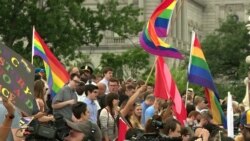Friday’s landmark Supreme Court decision legalizing same-sex marriage throughout the United States is an outcome few thought possible just years ago, and shows a nation that increasingly tolerates and even celebrates the hopes and aspirations of gay people.
Hundreds of euphoric gay rights backers celebrated outside the Supreme Court Friday, including Lena Hernandez, who wept with joy.
“This is such a great day, such a great day for us, for me and my wife,” said Hernandez. “I’m so excited – these are tears of happiness,” said she.
Hernandez and her spouse, Candy Cintron, married last year when same-sex unions became legal in the state of Virginia. Although work kept Cintron from joining Hernandez at the Supreme Court, the couple spoke with VOA at their home near Washington.
“When we decided to get married, I was betting on forever,” said Hernandez. “So [Candy] has a very long time she has to deal with me.”
“I gladly take that,” responded Cintron.
Because same-sex marriage came to Virginia thanks to lower federal court rulings, an adverse high court decision would have thrown into question the legality of their marriage, something they both treasure.
“[Marriage] makes you legal, makes you count,” said Cintron.
The couple is expecting a baby. Without a marriage license, Cintron’s legal rights as a spouse as well as the child’s second parent could be challenged.
“We are both very vested in having the kid,” said Cintron. “We are a couple, and if we go anywhere else where it is not recognized, where does that leave me?”
Now, that is one less concern for the couple as they prepare for motherhood.
“It is an overwhelming feeling, but I do not want to be in this with anybody but her,” said Hernandez. “I do not feel like I am doing it all by myself, which is very nice.”
The naysayers
But not everyone is cheering.
“This is a particularly difficult ruling for the Catholic Church,” said Chad Pecknold, who teaches theology at Catholic University in Washington and says the court decision conflicts with centuries of church teachings.
“Same-sex marriage is in fact not definitionally-marriage, but seeks to imitate marriage," said Pecknold.
He worries the legal empowerment of gay people will erode religious freedoms in America and constrain the church’s outreach to society.
“This is the fear is that we are increasingly, the Catholic Church and its institutions, are increasingly being vulnerable to anti-discrimination lawsuits because we have a different, we have indeed the ancient view of marriage,” he Pecknold.
Some legal experts say that fear is unfounded.
“No member of the clergy ever has to perform a same-sex marriage if he or she does not believe in that or wish to do so,” said Georgetown University law professor Nan Hunter. “Just like today members of the clergy sometimes do not perform inter-faith marriages if they object to that. It is really about the separation of Church and state.”
Cintron and Hernandez have a message for those who disagree with the Supreme Court.
“I would give them my shoes and say, ‘Walk a day in my life, and have your marriage questioned, and have your life questioned,'” said Cintron.
That sentiment was captured by Supreme Court Justice Anthony Kennedy, who wrote the majority opinion in the 5-4 decision legalizing same-sex marriage. Kennedy concluded by saying this of gay people: “Their hope is not to be condemned to live in loneliness, excluded from one of civilization’s oldest institutions. They ask for equal dignity in the eyes of the law. The Constitution grants them that right.”
In a dissent, Chief Justice John Roberts said the high court had usurped the democratic process. “The court is not a legislature,” he wrote.
Debate about same-sex marriage may go on, but from a legal standpoint, the issue is settled.





